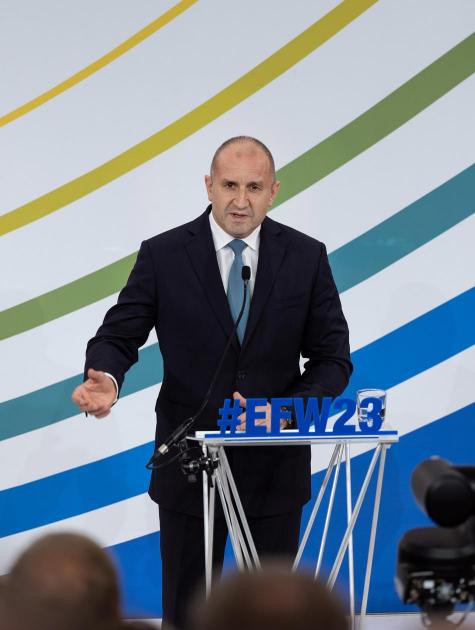President Rumen Radev at the Wachau European Forum: The accession of Bulgaria and Romania will contribute to security in the Schengen area
Bulgaria deserves much stronger support in guarding one of the EU's longest external borders and it is a big mistake that it was left to fend for itself for years, said Karl Nehammer

Not allowing Bulgaria and Romania into the Schengen area will not make Europe stronger and more secure. The two countries, as first-line countries on the European border, can contribute to the effective reformation of the Schengen system and join the joint efforts together with the other member states. This was stated by President Rumen Radev in his speech at the Wachau European Forum, which is being held in Austria. The event discusses the various policies for the future of Europe with the participation of politicians and civil society representatives.
The European way of life means security and prosperity, said Rumen Radev. According to him, the inclusion of Bulgaria in Schengen will contribute in this direction, especially in times of crisis. "We fully understand that Schengen is a sensitive topic for the Austrian society, and I am not here to lobby, but to state that Bulgaria protects the 300 km border, which is the external EU, in the best possible way," the head of state pointed out.
He noted that our country has financed the protection of the border with national funds, and a significant human resource, including military personnel, has been mobilized to guard the border in the hard-to-reach areas. Last year, the migratory pressure increased 4 times, but our country reported a serious decrease in the number of migrants leaving the country.
President Radev expressed his gratitude to Austria for its support in the fight against illegal traffic and border protection. "We must empathize with the plight of people who cross the border. Powerful international traffic networks benefit from them," the president pointed out. He added that powerful centers for financing illegal migration are located throughout Europe. Therefore, in addition to Bulgaria making efforts to protect the border, our country has initiated a working group for cooperation and exchange of information and with the aim of interrupting and neutralizing the international financial flows that control illegal migration.
In his speech to the forum participants, Rumen Radev pointed out that Bulgaria is among the strong supporters of the European integration of the Western Balkans. In the current critical situation, however, we must not compromise with the observance of the Copenhagen criteria for membership and the protection of human rights, the president stated and gave the example of the Republic of North Macedonia and the provision of the necessary guarantees for the observance of the rights of the Bulgarians there and their inclusion in the constitution of the country.
The head of state also stated that in the context of the war in Ukraine, EU and NATO countries must take all measures to ensure the security of European citizens. According to him, the latest development of the situation in Russia with the Wagner group creates a new center of instability given the country's nuclear and chemical weapons.
The Chancellor of Austria Karl Nehammer highlighted as a big mistake of the EU that in the past years Bulgaria was left alone to deal with the protection of one of the longest external land borders of the EU, including at the cost of human sacrifices. Karl Nehammer thanked for the friendly relations built over the years with President Rumen Radev and highlighted the strong support he provided within the framework of the European Council to support Bulgaria's efforts to protect the external borders with Turkey. Austria believes that the bureaucratic approach is not fair and Bulgaria deserves much stronger support as a frontline country in the fight against illegal migration.
The Prime Minister of Italy, Giorgia Meloni, also took part in the event. The international event in Lower Austria has been organized since 1995, when Austria joined the EU, and takes place in the Gottweig Abbey as a symbol of the unifying idea of European politics, Christian values and taking into account the positions of society.
